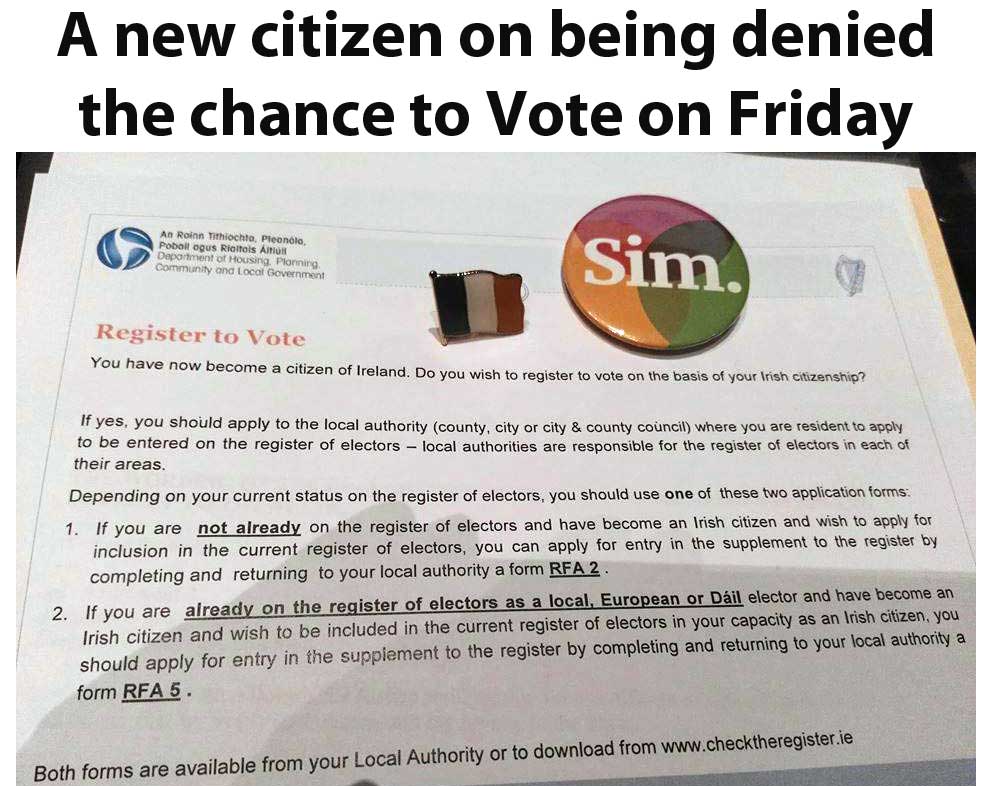Over 30 years of anarchist writing from Ireland listed under hundreds of topics
New citizens denied vote in the Repeal Referendum
 While there is a lot of focus on Irish citizens returning home to vote Yes in the Repeal referendum what has received less attention are the huge numbers of non-citizens resident in Ireland who have no vote. They are also trapped under the 8th amendment. Some 3,000 have recently received Irish Citizenship but shockingly it turns out they have not been added to the electoral register even though arrangements are made for young people turning 18 just before May 25th.
While there is a lot of focus on Irish citizens returning home to vote Yes in the Repeal referendum what has received less attention are the huge numbers of non-citizens resident in Ireland who have no vote. They are also trapped under the 8th amendment. Some 3,000 have recently received Irish Citizenship but shockingly it turns out they have not been added to the electoral register even though arrangements are made for young people turning 18 just before May 25th.
One of the women affected writes for us below;
"Today I became a dual citizen. Personally I cannot really call myself Irish, but I am happy to have the privilege of holding 2 nationalities.
The concepts of "the newest Irish citizens" and "becoming part of the Irish global family" used by Minister of State David Stanton in his speech was rather aspirational in my opinion. He talked about "community, harmony, respect for cultural differences" so many times that I could not help but think about the structural racism built into the immigration and education systems; employment rights; housing; etc. that create so many barriers for migrants.
Here is a timely example of structural racism. As part of my obligations as an Irish citizen, I truly expected to be able to vote in the upcoming referendum! I tried to fill in the form but a Garda said that he could not sign it because there was no alternative for the “new Irish” on the form. I was told to contact the Dublin City Council, where I was also told that I could not vote because the deadline for the registration was on 8th May. However, an Irish born citizen who turns 18 after the registration period can still vote. I am entirely sure that after going through the whole citizenship process, including paying a total of €1,125 in fees, people will definitely “opt” to become a citizen and therefore they should be entitled to vote in this referendum!
It is very disappointing that I cannot vote. This referendum is probably the most important moment for women in Ireland for a generation, particularly migrant and ethnic-minority women who are disproportionally affected by the 8th amendment. Migrant and ethnic-minorities rarely have a say in Ireland, they are marginalised and often excluded from full participation in Irish society. I would have expected that the “newest Irish” would be included from the start of their citizenship, rather than whenever suits the state. The voting instructions that I received with my citizenship papers failed to mention the upcoming referendum, as it has only provided basic information on how to register for elections.
I wish I could represent my migrant and ethnic-minority sisters at the polling station on Friday.
I am thankful to everyone here in Ireland who received me with open arms but as we all know, we still have a long way to go towards achieving this "Irish family"."

